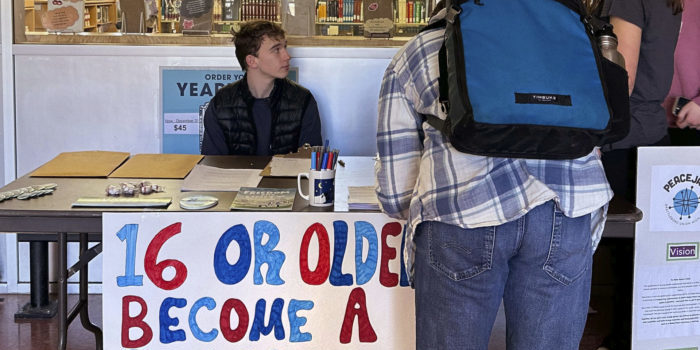(Headline USA) A Vermont town is giving 16- and 17-year-olds the right to vote next week in local elections as Democrat-run cities test out new strategies to add to their fast-waning electorate ahead of the 2024 election.
The teens benefiting from the new policy seemed to have few qualms with it, reassuring skeptics that they were well-informed and capable of making wise decisions.
Silas Brubaker, a 17-year-old senior at Brattleboro Union High School, said he was qualified “because I know what’s going on in the world.” However, he planned to do research before making his selections on Tuesday in local races.
“I’m not too young or too naïve to know what’s happening and to know what I want to be happening,” Brubaker said.
“And when those things conflict, it feels very unfair and wrong for me not to be able to do anything in an official sense,” he complained. “Like, I can go to protests, I can speak my mind, but I can’t do anything in a legal sense and now I can, so that’s exciting.”
The move comes as President Joe Biden loses considerable ground to existing Gen-Z voters—whose approval of former President Donald Trump has roughly doubled since the last election—as well as other crucial demographics, including black and Hispanic voters.
Theoretically, the non-adults would only be able to vote in local elections for the town of Brattleboro, population 7,500. Yet, given the prevalence of mail-in voting, which the Left has staunchly supported, it could muddy the waters if teens were to complete the entire ballot and later claim confusion if detected.
Adding to the chaos, the town’s ordinance also allows those who will turn 18 by the November general election to vote in the state’s presidential primaries on Super Tuesday.
The change to the town’s charter required legislative approval, and Republican Gov. Phil Scott twice rejected the measures.
Last year, however, the Democrat-controlled state legislature overrode the governor’s veto, giving more Brattleboro teenagers the green light to vote, to run for Brattleboro’s primary governing body, and to be chosen as representatives to an annual town meeting where many local issues are decided.
Lawmakers stopped short of giving 16- and 17-year-olds the ability to serve on the local school board, which was originally part of the measure town residents approved back in 2019.
Battlebro is not the only blue-run city piloting the latest scheme. In Michigan, once considered a leading tossup state that was key to former President Donald Trump’s 2016 victory, far-left Gov. Gretchen Whitmer and Secretary of State Jocelyn Benson helped shore up their own political “security” by passing a raft of new laws under the pretense of safeguarding elections. Among their new “safety” measures was one to register underage voters.
Some communities in Maryland have already lowered the voting age to 16 for municipal elections. The city council in Newark, New Jersey, approved a measure in January to allow that age group to vote in school board races. Two cities in California lowered the voting age to 16 for school board seats, but those changes have not gone into effect.
Battleboro’s effort to lower the voting age started years ago. Rio Daims worked on the youth vote campaign in 2018, when she was 16. Now she’s a 22-year-old college student studying political communication.
“It’s exciting, but I also just really, really hope that there are other excited teenagers who are making the moves to get the word around,” she said, “because unless they’re told, they’re not going to assume this is a possibility.”
Daims’s father, Kurt Daims, director of Brattleboro Common Sense, was director of the youth voting campaign starting in 2013 but said he didn’t feel “it’s a full victory” because young voters were excluded from serving on the school board.
Senior Django Grace, who helped organize a voter drive at the high school, said turnout dropped during the pandemic and civic engagement has plummeted. Bringing younger voters into the process can only help.
“Giving us the vote allows us to apply whatever we’re learning in class,” said Grace, who just turned 18 and is running to be a town meeting representative. ”It makes it relevant.”
For some, however, that may be precisely the problem. As parents push back nationwide against indoctrination efforts in classrooms, where leftists disproportionately fill the faculty ranks due the the Marxism-inspired educational policies, some fear that students lacking any actual real-world experience or sense of personal accountability will be particularly pliable to pandering and false promises from bad actors seeking to exploit their idealism.
To date, at least 37 teens have registered, according to the town clerk’s office. Many signed up during the voter drive at the school on Feb. 14, which senior Eva Gould also helped pull together.
“This is the future, and these are the people who are going to be voting in our elections and are going to be running in our elections as well,” Gould said. “They know a lot more than a lot of people do, honestly.”
Adapted from reporting by the Associated Press

